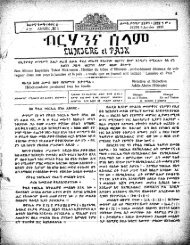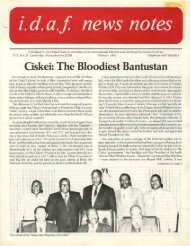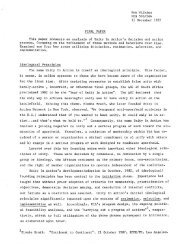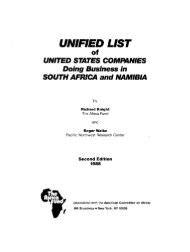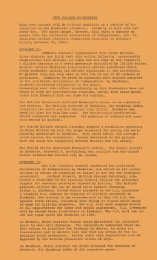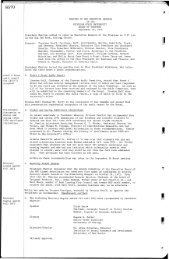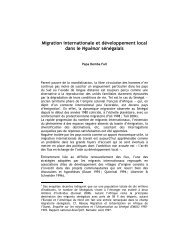- Page 1: GUM OF MECAlS LIBERATION STRUGGLE l
- Page 5 and 6: NO ONE CAN STOP THE RAIN Glimpses o
- Page 7: Here in prison rage contained in my
- Page 10 and 11: Contents 7 Tom Mbya and the Kenya E
- Page 12 and 13: Contents Economic Disengagemenl 269
- Page 14 and 15: the committee have continued to be
- Page 17 and 18: A Acknowledgments couple of years b
- Page 19 and 20: CRUA FLN GPRA MTLD PPA PDA SARA UNI
- Page 21 and 22: CANU DTA ONC OPO SWANLA SWANU SWAP0
- Page 23 and 24: Pa&, Mov~ts, and Ovankatiotts Colon
- Page 25: Africa 1987
- Page 28 and 29: t was still dark at 4:30 A.M. when
- Page 31 and 32: CHAPTER ONE Becoming Involved in Af
- Page 33 and 34: Becoming In~olved in Awa 7 law in U
- Page 35 and 36: Becoming Involved in Africa 9 the k
- Page 37 and 38: Nonviolent Fighters for Freedom the
- Page 39 and 40: Nonviolent Fighters for Freedom I3
- Page 41 and 42: Nonviolent Fighters for Freedom he,
- Page 43: Nmviolent Fighters for Freedom I7 t
- Page 47 and 48: z Journey to Africa CHAPTER THREE K
- Page 49 and 50: Journey to Africa London. He was cl
- Page 51 and 52: American Colooization Society. When
- Page 53 and 54: Jmmy to Africa 27 his term still un
- Page 55 and 56: people, including many children, wh
- Page 57 and 58: J0um.y to Africa 31 historic Christ
- Page 59 and 60: Journey to Africa and maparound ski
- Page 61 and 62: THE CAMEROONS After the dynamism of
- Page 63 and 64: confined to bed, and their families
- Page 65 and 66: Journey to Af~ca 39 babble of voice
- Page 67 and 68: she doubted the mission would be th
- Page 69 and 70: Joumy ro Africa felt quite comforta
- Page 71 and 72: W~th Portugal the poorest country i
- Page 73 and 74: Schaad said that frequently village
- Page 75 and 76: place in Africa I didn't want to wo
- Page 77 and 78: Journey lo Africa 51 pieces of tin
- Page 79 and 80: Journey ro Africa Chief Mbat J. Lut
- Page 81 and 82: Journey to Africa 55 'He was also a
- Page 83: with the Defiance Campaign, which h
- Page 86 and 87: I n the 1950s Africa was not a cont
- Page 89 and 90: CHAPTER FOUR Bridging the American-
- Page 91 and 92: Bridgtng the A-can-African Gap 65 a
- Page 93 and 94: Nknunah, Ghana, and Pan-Africanism
- Page 95 and 96:
Nkrumah, Ghnu, and Pan-Africanism 6
- Page 97 and 98:
Nkmmah, Ghana, and Pan-Africanism 7
- Page 99 and 100:
Nkrumah, Ghana, and Pan-Afhcanism 7
- Page 101 and 102:
Nkrumah, Ghana, mrd Pan-Africanism
- Page 103 and 104:
Birth of an Angolan Movement 77 pla
- Page 105 and 106:
Birth of an Angolan M- 79 b u d to
- Page 107 and 108:
CHAPTER SEVEN Tom Mboya and the Ken
- Page 109 and 110:
Tom Mboya and the Kenya Emergency 4
- Page 111 and 112:
Tom Mboya and the Kenya Ewgemy Lytt
- Page 113 and 114:
Tm Mboya and the Kqa Emqpc~ Tom Mbo
- Page 115 and 116:
Tom Mboya and the Kenya Emergency 8
- Page 117 and 118:
CHAPTER EIGHT Algeria and the Natio
- Page 119 and 120:
Algeria and the National Liberation
- Page 121 and 122:
Algeria and the National Liberation
- Page 123 and 124:
Algeria and the National Liberation
- Page 125 and 126:
CHAPTER NINE The Central African Fe
- Page 127 and 128:
The Central African Federatiun The
- Page 129 and 130:
The Cmal Afrtcan Federation NKOMO A
- Page 131 and 132:
The Central African Federation 105
- Page 133 and 134:
The Cennal African Federation 107 g
- Page 135 and 136:
The Central Afican Federation Kaund
- Page 137 and 138:
South Africa's "Colony" SCOTT AND K
- Page 139 and 140:
South Af~car's "Colony" After long
- Page 141 and 142:
South Africds "Colony" 1x5 UN, and
- Page 143 and 144:
CHAPTER ELEVEN From Treason to Mass
- Page 145 and 146:
From Treason to Massacre in South A
- Page 147 and 148:
I ' - '' From T~ason to Massacre in
- Page 149 and 150:
From Treasm to Massacre in South Af
- Page 151 and 152:
From Treason to Massacre in South A
- Page 153 and 154:
From Treason to Massacre in South A
- Page 155 and 156:
From Treasun to Massacre in South A
- Page 157:
From Treason to Massacre in South A
- Page 160 and 161:
A himultuous period begins with the
- Page 162 and 163:
136 Years of Turntoil change things
- Page 164 and 165:
CONFERENCE IN BRUSSELS The Brussels
- Page 166 and 167:
leave the country and appealed to t
- Page 168 and 169:
142 Yems of Turmoil Indar Rikye, he
- Page 170 and 171:
144 Years of Turmoil news. Adlai St
- Page 172 and 173:
Years of Turmoil policy" Groups suc
- Page 174 and 175:
Yean of Turmoil MOBUTU IN POWER In
- Page 176 and 177:
CHAPTER THIRTEEN Angola: The Stormy
- Page 178 and 179:
152 Years of Tunnoil United States
- Page 180 and 181:
planned. The Portuguese were forced
- Page 182 and 183:
J&o Batism, UPA commander, reading
- Page 184 and 185:
there was always danger. We wimesse
- Page 186 and 187:
Angola prison attack, and the Unite
- Page 188 and 189:
Yean of Turmoil HEADY DAYS FOR THE
- Page 190 and 191:
that the MPLA was refused affiliati
- Page 192 and 193:
166 Years of Turmoil Jonas Savimbi,
- Page 194 and 195:
I 68 Years of Turmoil protested, he
- Page 196 and 197:
170 Yean of Turmoil to combat the i
- Page 198 and 199:
performed amputations without anest
- Page 200 and 201:
Ears of Tumoil toward unity. I was
- Page 202 and 203:
generally held- We discussed at len
- Page 204 and 205:
Years of Tunnoil presence no one co
- Page 206 and 207:
he attracted large crowds. Afi-i- a
- Page 208 and 209:
Years of Turnoil vote. Back in New
- Page 210 and 211:
part of the third group. When the m
- Page 212 and 213:
Years of Tunnoil In March 1968 FREL
- Page 214 and 215:
Eduardo Mondlane, president of FREL
- Page 216 and 217:
medical supplies. Both the People's
- Page 218 and 219:
said over aud over again in all par
- Page 220 and 221:
make it easier to transport rhe sch
- Page 222 and 223:
Years of Turmoil pretty good idea o
- Page 224 and 225:
had committed crimes and feared pun
- Page 226 and 227:
intellectual that he was. He certai
- Page 228 and 229:
tuguese definition in 1950. The lin
- Page 230 and 231:
work in the urban areas would conti
- Page 232 and 233:
joao Bemado Vjcira (Nino, center& a
- Page 234 and 235:
208 Yean of Turntoil air attack. On
- Page 236 and 237:
aro Ym oflirtmoil Students in a PAI
- Page 238 and 239:
constitution and elect a national a
- Page 240 and 241:
Years of Turmoil the Republic of Gu
- Page 242 and 243:
Five months after the proclamation,
- Page 244 and 245:
218 Years of Tuntulil from local gu
- Page 246 and 247:
Years of Timil was a schizophrenic
- Page 248 and 249:
222 Yean of Turmoil of African poli
- Page 250 and 251:
a4 Yens of Turmoil In this time of
- Page 252 and 253:
Years of ~nnotl The government-inde
- Page 254 and 255:
228 Years of Turnoil outdrew Shona
- Page 256 and 257:
230 Years of %moil Frequent declara
- Page 258 and 259:
Order Maintenance Act. They were he
- Page 260 and 261:
whom 923 had been released and 689
- Page 262 and 263:
Caom Nyradoro aad Joson Mayo, leade
- Page 264 and 265:
THE NEW OFFENSIVE Vbrd of a greatly
- Page 266 and 267:
Years of Turnoil defy the governmen
- Page 268 and 269:
242 Ears of Tunnoil I 1 3fl had a r
- Page 270 and 271:
Yems of Turmoil Increasingly I saw
- Page 272 and 273:
all over in one day without a satis
- Page 274 and 275:
Years of Turmoil trainees wanted to
- Page 276 and 277:
250 Years of Turmoil reported two S
- Page 278 and 279:
Ears of Tunnoil owned industry. For
- Page 280 and 281:
actively discourage American invest
- Page 282 and 283:
South Africa: "No Easy Walk to Free
- Page 284 and 285:
Laws Amendment Act. He was held at
- Page 286 and 287:
leader respected by all and better
- Page 288 and 289:
Yems of Turmoil the National Union
- Page 290 and 291:
the Suppression of Communism Act. H
- Page 292 and 293:
266 Yems of Turmoil Martin Luther K
- Page 294 and 295:
Ears of Tamil The various administr
- Page 296 and 297:
270 Yean of Turmoil economic diseng
- Page 298 and 299:
Indres Naidoo, a South African r e1
- Page 300 and 301:
he was being driven. He was shot in
- Page 302 and 303:
Years of Turmoil visa for Ashe seem
- Page 304 and 305:
278 Years of Turmoil A day or so la
- Page 306 and 307:
T he owdmw of the government in Lis
- Page 308 and 309:
The Final Conflict Agostinho Neto's
- Page 310 and 311:
The Final Conflict on the size of t
- Page 312 and 313:
The Final Confict plistidy, would t
- Page 314 and 315:
The Final ConJIict He was unhappy a
- Page 316 and 317:
The Final Conflict the Soviet Union
- Page 318 and 319:
TIre Final Conj'llct the Clark and
- Page 320 and 321:
The Final Conflict Cabinda Gult Thr
- Page 322 and 323:
The Final ConjPict A Portuguese exo
- Page 324 and 325:
298 The Final Conflict they were nu
- Page 326 and 327:
300 The Final Conflict already bein
- Page 328 and 329:
The Final Cm.ict population in such
- Page 330 and 331:
304 The Final Conpict when I return
- Page 332 and 333:
The Find Conflict a young woman mat
- Page 334 and 335:
308 The Final Conflict schools and
- Page 336 and 337:
310 The Final C&ict held since 1884
- Page 338 and 339:
The Fiml Conflict Sahara. His repor
- Page 340 and 341:
The Final Conflict for teaching the
- Page 342 and 343:
Tk Final Conflict Jose: Artajo (lef
- Page 344 and 345:
318 The Final Conflict s i - POLISA
- Page 346 and 347:
320 The Final Conflict sight of the
- Page 348 and 349:
The Final Cmrflct The year 1979 was
- Page 350 and 351:
324 The Fiml Conflict POLISARIO. "O
- Page 352 and 353:
CHAPTER TWENTY-TWO Zimbabwe: Winnin
- Page 354 and 355:
Roben Mugabe, president of ZANU, in
- Page 356 and 357:
330 The Final Conflict settlement o
- Page 358 and 359:
331 The Final Cmflkt were expected
- Page 360 and 361:
334 The Final CmflkC had a coworker
- Page 362 and 363:
336 The Final Conflict A resolution
- Page 364 and 365:
338 The Final CmJict National Publi
- Page 366 and 367:
340 The Final Conflict the end of t
- Page 368 and 369:
342 The Final Conflict hundreds of
- Page 370 and 371:
The Final Conflict Kingsway was cha
- Page 372 and 373:
The Final Conpict singing forbidden
- Page 374 and 375:
348 The Final Conflict Council. The
- Page 376 and 377:
The Final Conpict the recognition o
- Page 378 and 379:
352 The Final Conflict forbidding i
- Page 380 and 381:
The Final Conflict computenr to the
- Page 382 and 383:
Hage Oringob, director of the UN In
- Page 384 and 385:
358 The Final Cmflict who could vet
- Page 386 and 387:
CHAPTER TWENTY-FOUR "You've Got to
- Page 388 and 389:
The Final Conflict objective noninv
- Page 390 and 391:
364 The Find Cmflict have been trag
- Page 392 and 393:
3 6 The Final Conpier sir?" "Yes, I
- Page 394 and 395:
368 Notes 8. George Loft to Houser,
- Page 396 and 397:
Notes 3. Quoted in Steve Biko, BIac
- Page 398 and 399:
Index Altena Farm, 238 AIves, Nito,
- Page 400 and 401:
374 Index Cabinda Gulf Oil, 293, 29
- Page 402 and 403:
376 Index E~YWY 60~70~ 721 127, 14%
- Page 404:
ICJ (International Court of Justice
- Page 407 and 408:
NAACP (National Association for the
- Page 409 and 410:
eception center of, 309,312,321; du
- Page 411 and 412:
Index Southan Chdstiao Leademhip Co
- Page 413 and 414:
tabinon Service (Sponono case), 276


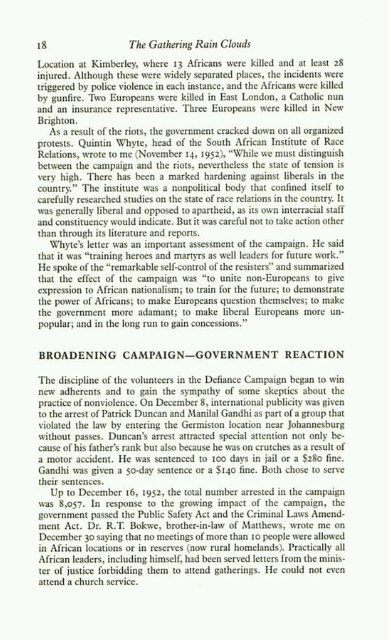
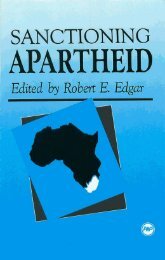
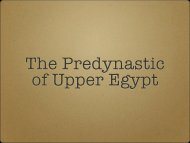
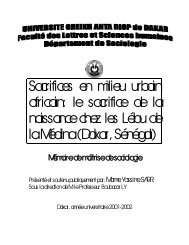
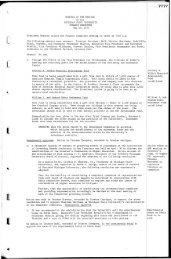
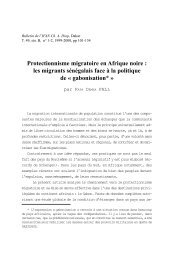
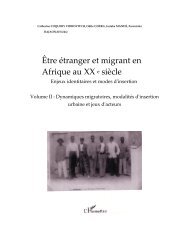
![Synthèse [6] DEFALL..INSTRAW.pdf - Matrix](https://img.yumpu.com/17880734/1/190x245/synthese-6-defallinstrawpdf-matrix.jpg?quality=85)
